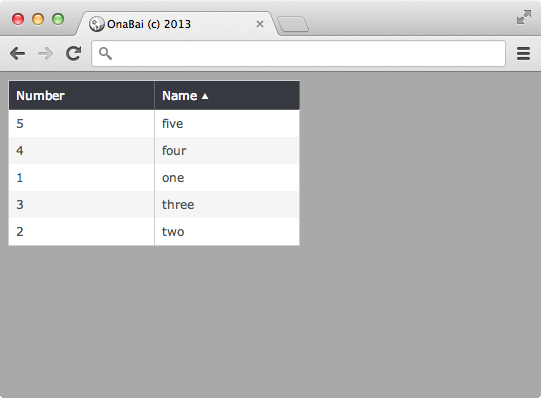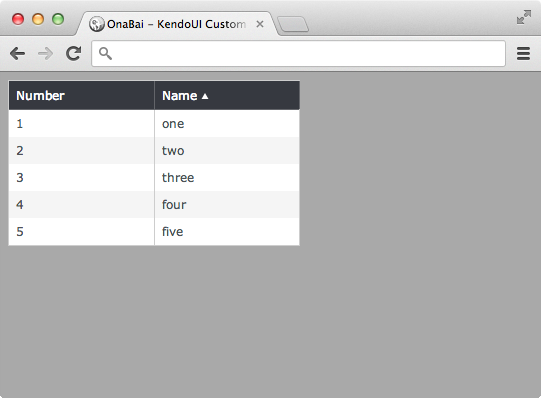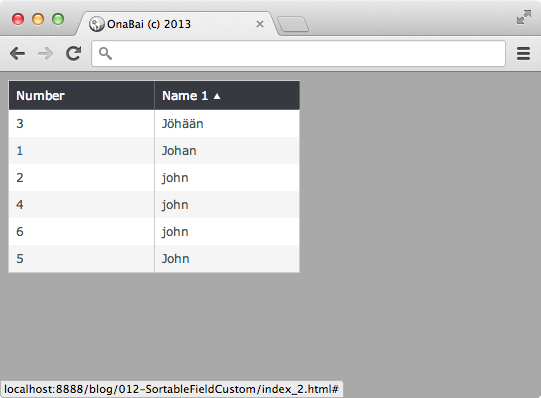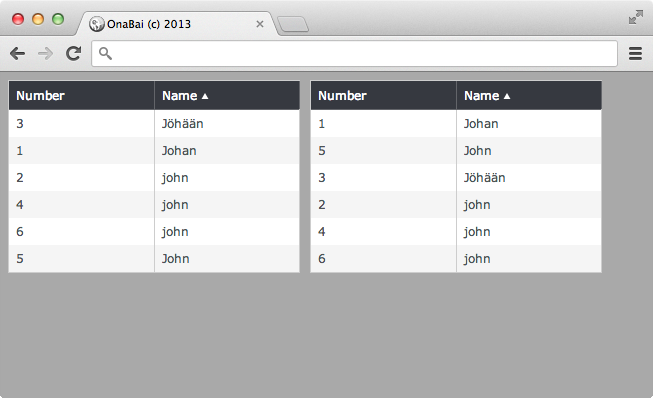There was a couple of times that I have had to sort columns in a KendoUI Grid but using my custom order. I mean, not using out-of-the-box ordering but doing something especial. Example: order ignoring accents, upper-lower case… but I couldn’t find how to do easily do it and end-up implementing server side filtering and sending the data sorted from the server. For what I was looking for, that was acceptable but this is not always desirable.
This week Atanas Korchev (@korchev) from Telerik, show us how to do it in Stack Overflow: easy and neat! Let me show you how.
KendoUI Grid: defining sortable columns
This is pretty easy, just define sortable: true in your Grid and it will work.
$("#grid").kendoGrid({
dataSource: {
data : [
{ id: 1, name: "one" },
{ id: 2, name: "two" },
{ id: 3, name: "three" },
{ id: 4, name: "four" },
{ id: 5, name: "five" }
],
pageSize: 10,
schema : {
model: {
fields: {
id : { type: 'number' },
name: { type: 'string' }
}
}
}
},
editable : false,
pageable : false,
sortable : true,
columns : [
{ field: "id", title: "Number" },
{ field: "name", title: "Name" }
]
});
And you get:

and if you click on the column header it will sort the column numerically or alphabetically.
KendoUI Grid: Defining custom order
But, what about if you want to order the column by Name but you want that it should be considered as numbers…
If we look at KendoUI documentation about sortable we can define it at Grid level:

and at column level:

But despite the first says Can be set to a JavaScript object which represents the sorting configuration it does not provide any detail.
At least now, we have some details. Here is how to define a custom compare function.
KendoUI Grid: Custom compare function
Despite the documentation says that columns.sortable needs to be a Boolean it actually can be an object and one of the members of this object is a compare function that return -1 if first argument is less than seconde, 0 if both are the same or +1 if the second is greater that then first.
{
field : "name",
width : 200,
title : "Name",
sortable: {
compare: function (a, b) {
return numbers[a.name] - numbers[b.name];
}
}
}
Now, for the sake of this example, what I do is defining an associative array for translating number names into numbers (this is only an example!).
var numbers = {
"one" : 1,
"two" : 2,
"three": 3,
"four" : 4,
"five" : 5
};
Now, my grid definition is:
var grid = $("#grid").kendoGrid({
dataSource: {
data : [
{ id: 1, name: "one" },
{ id: 2, name: "two" },
{ id: 3, name: "three" },
{ id: 4, name: "four" },
{ id: 5, name: "five" }
],
pageSize: 10,
schema : {
model: {
fields: {
id : { type: 'number' },
name: { type: 'string' }
}
}
}
},
editable : false,
pageable : false,
sortable : true,
columns : [
{ field: "id", title: "Number" },
{
field : "name",
title : "Name",
sortable: {
compare: function (a, b) {
return numbers[a.name] - numbers[b.name];
}
}
}
]
}).data("kendoGrid");
And when sorting what I get is:

KendoUI Grid: custom sorting strings
Have you ever tried sorting a column with string with mixed upper-lower case, accents…? Seems that KendoUI engineers have considered that we want alphabetical order (which is very useful) and not ASCII order.
Let’s consider that we have the following data in our DataSource
[
{ id: 1, name: "Johan" },
{ id: 2, name: "john" },
{ id: 3, name: "Jöhän" },
{ id: 4, name: "john" },
{ id: 5, name: "John" },
{ id: 6, name: "john" }
]
Where we see John in uppercase (record with id 5) and in lowercase (record with id 2, 4 and 6) or Johan with different punctuations.
If we define a Grid with this data and sort it by column name
var grid = $("#grid").kendoGrid({
dataSource: {
data : [
{ id: 1, name: "Johan" },
{ id: 2, name: "john" },
{ id: 3, name: "Jöhään" },
{ id: 4, name: "john" },
{ id: 5, name: "John" },
{ id: 6, name: "john" }
],
pageSize: 10,
schema : {
model: {
fields: {
id : { type: 'number' },
name: { type: 'string' }
}
}
}
},
editable : false,
pageable : false,
sortable : true,
columns : [
{ field: "id", title: "Number" },
{ field: "name", title: "Name" }
]
}).data("kendoGrid");
What I get is:

That show that “Jöhään” is lower than “Johan” and “john” is always lower than “John” (odd?!)
Let’s define a sorting function using standard order. What I will do show side by side two grids with the same data.
My Grid definition is:
var grid1 = $("#grid1").kendoGrid({
dataSource: {
data : [
{ id: 1, name: "Johan" },
{ id: 2, name: "john" },
{ id: 3, name: "Jöhään" },
{ id: 4, name: "john" },
{ id: 5, name: "John" },
{ id: 6, name: "john" }
],
pageSize: 10,
schema : {
model: {
fields: {
id : { type: 'number' },
name: { type: 'string' }
}
}
}
},
editable : false,
pageable : false,
sortable : true,
columns : [
{ field: "id", title: "Number" },
{ field: "name", title: "Name" }
]
}).data("kendoGrid");
var grid2 = $("#grid2").kendoGrid({
dataSource: {
data : [
{ id: 1, name: "Johan" },
{ id: 2, name: "john" },
{ id: 3, name: "Jöhään" },
{ id: 4, name: "john" },
{ id: 5, name: "John" },
{ id: 6, name: "john" }
],
pageSize: 10,
schema : {
model: {
fields: {
id : { type: 'number' },
name: { type: 'string' }
}
}
}
},
editable : false,
pageable : false,
sortable : true,
columns : [
{ field: "id", title: "Number" },
{
field : "name",
title : "Name",
sortable: {
compare: function (a, b) {
return a.name === b.name ? 0 : (a.name > b.name) ? 1 : -1;
}
}
}
]
}).data("kendoGrid");
You can se that for the first Grid I do not define any “special” sortable option while for second, I defined a compare function that returns 0, 1 or -1.
compare: function (a, b) {
return a.name2 === b.name2 ? 0 : (a.name2 > b.name2) ? 1 : -1;
}
Now, if I order incrementally by name both Grids, I get:

Where now uppercase come before lowercase and non accented character also before than same with accent or punctuation.